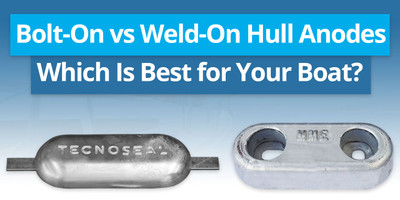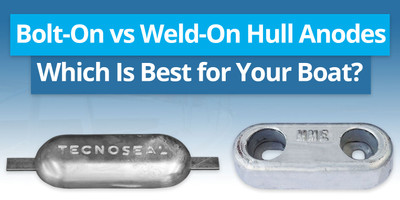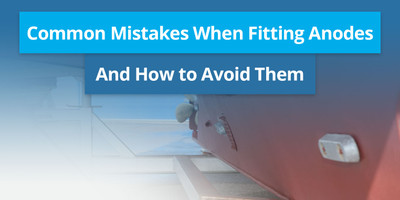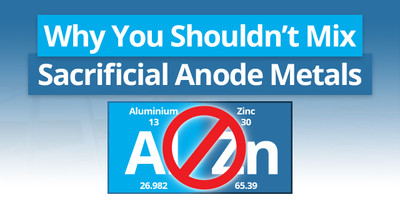17th Sep 2025
Protecting your boat from corrosion is one of the most important aspects of hull maintenance. Sacrificial anodes, often made from zinc, aluminium or magnesium, play a vital role in this process by corroding in place of more critical metal components. But when it comes to choosing hull anodes, boat owners are often faced with the choice between bolt-on and weld-on options. While both serve the same fundamental purpose, they differ in installation methods, applications, and long-term maintenance. Understanding the differences will help you select the right anode type for your vessel.
Bolt-On Hull Anodes
Bolt-on anodes are exactly what their name suggests: they are secured to the hull using bolts, often through pre-drilled holes in the anode itself. This type of fitting is relatively straightforward, making it popular with leisure boat owners, boatyards, and anyone who wants an easier, less permanent installation. One of the main benefits of bolt-on anodes is convenience. They can be fitted without specialist welding equipment, which makes them a great choice for smaller vessels or for owners who prefer to carry out their own maintenance.
Another advantage is ease of replacement. Because bolt-on anodes can be removed with basic tools, they can be swapped out quickly during routine servicing or when hauled out of the water. This flexibility is particularly useful for vessels that are maintained regularly or for owners who store their boats ashore in the off-season. The downside is that the bolts themselves can become a weak point if not maintained properly, and the fitting may not be as robust as a welded alternative, especially for larger, heavy-duty vessels.
Weld-On Hull Anodes
Weld-on anodes, by contrast, are permanently attached to the hull via welding. This creates an exceptionally strong and secure connection, ensuring the anode maintains good electrical continuity with the hull throughout its lifespan. Because of their durability, weld-on anodes are more commonly found on commercial vessels, working boats, and larger yachts where reliability is critical and maintenance schedules are less frequent.
The key benefit of weld-on anodes is the strength of attachment. They are less likely to loosen or detach, even under harsh operating conditions, such as extended time at sea or in areas with strong currents. This makes them ideal for vessels that see heavy use and cannot afford the downtime associated with more regular replacement. However, welding requires professional installation, which can make them less convenient for casual boat owners. Replacing weld-on anodes is also more involved, often requiring a welder to cut off the old fittings and attach new ones.
Bolt-on anodes vs weld-on anodes - which should you choose?
The choice between bolt-on and weld-on hull anodes depends largely on the type of vessel you own and how you use it. For leisure craft and smaller boats, bolt-on anodes usually offer the most practical solution thanks to their ease of installation and replacement. For commercial vessels, workboats, or larger yachts, weld-on anodes provide a stronger, more durable option that ensures consistent protection over long periods without the need for frequent attention.
Other Considerations:
Regardless of the fitting method, choosing the correct anode material for your water type is just as important. Zinc anodes are traditionally used in saltwater, aluminium is effective in both salt and brackish waters, and magnesium is reserved for freshwater use. It’s also essential to regularly inspect your anodes: once they are around 50% consumed, it’s time to replace them.
Ultimately, both bolt-on and weld-on hull anodes serve the same vital function of protecting your boat from galvanic corrosion. The decision comes down to balancing ease of maintenance with long-term security. By understanding the differences and selecting the right option for your vessel, you’ll ensure your hull and fittings remain protected, giving you peace of mind on the water.
Frequently Asked Questions (FAQs)
Here are some of our most common questions about hull anodes, especially bolt-on vs weld-on, along with answers:
Do weld-on anodes always perform better than bolt-on?
Not always “better” in every sense, but weld-on anodes do generally offer more secure electrical contact and durability. The trade-off is higher cost and more complicated replacement. For many recreational boatowners, well-fitted bolt-on anodes that are regularly inspected perform adequately. For commercial or heavy use, weld-on is often preferred.
Can I convert a bolt-on anode to weld-on (or vice versa)?
Yes, in many cases you can. The decision depends on whether welding is feasible on your hull material, and whether you have access to the location needed (and budget). Converting to weld-on can be worth it if maintenance is difficult or bolt joints keep failing. Converting to bolt-on may make sense if you haul the boat often or want simplicity.
How do I know whether the anode is electrically well connected?
You look for a clean metal-to-metal contact. With bolt-ons, ensure bolts are tight, threads clean, the contact surface isn’t painted over. With weld-on, ensure welds are solid, corrosion hasn’t broken connections. In both cases, avoid coatings interfering with contact. Also, presence of corrosion on protected parts can be a clue that contact is poor. Some owners use multimeters to check continuity between anode and hull.
What determines how many anodes I need and how big they should be?
Size, number and placement depend on the total exposed metal area you want to protect, water type (salt, brackish, fresh), how often boat is in water vs out, expected current loads (both galvanic and stray). As a rough rule: larger surface area => more or bigger anodes; harsher conditions or less frequent maintenance => more margin. Too small or too few anodes will lead to rapid consumption and under-protection.
Is there a risk of using the wrong alloy (e.g. zinc where aluminium or magnesium would do better)?
Yes. If you use zinc in brackish or freshwater environments, for example, it may not provide good enough protection and may corrode too slowly or ineffectively. Aluminium may be more appropriate in certain brackish or mixed conditions. Magnesium works well in freshwater but not in salty water. Using the wrong alloy can lead to faster wear or insufficient protection, which can cause more serious corrosion.
Can weld-on anodes cause problems (e.g. leaks, structural issues)?
It depends. Welding introduces heat, which may affect surrounding metal. On alloy hulls (e.g. aluminium), welding must be done correctly using suitable filler metals and technique to avoid weakening. Also, welds may need protection (coatings) to prevent corrosion. Poorly done welds or gaps can lead to moisture ingress, corrosion under coatings, or structural fatigue. So quality of work matters.



